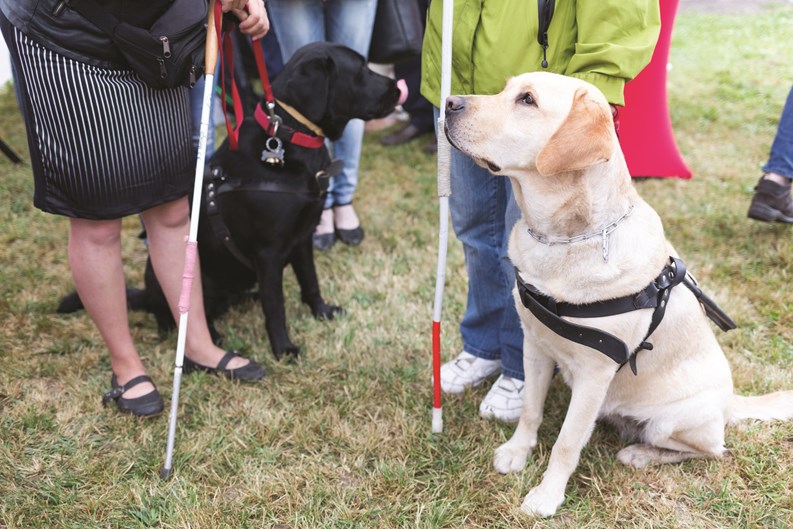Rule enforcement can often be a point of tension in a condo, co-op or HOA—but when it comes to the potential for sheer acrimony, nothing beats a pet ban. Enacting one can be a heated affair, leading to fights and arguments across the community, and enforcing an existing ban on pets can also result in a massive headache, particularly when it comes to the issue of so-called ‘emotional support animals.’ That’s partly because, according to information provided publicly by the Judge David L. Bazelon Center for Mental Health Law, based in Washington, D.C., both boards and landlords must make ‘reasonable accommodation’ for any and all disabled individuals—and there are an array of disabilities (some visible to the casual observer and some not) for which ‘reasonable accommodation’ includes the use of a service animal. No decent person—or board, for that matter—would begrudge a disabled individual the use of a service or emotional support animal (ESA), but the proliferation of disingenuous and flat-out phony organizations offering service animal ‘certifications’ has made it difficult for boards to discern which animals are legit, and which ones are pets whose owners are willing to fudge the truth.
In the Doghouse
“I wish I could say otherwise, but when it comes to support animals, the abuse is staggering,” says attorney JoAnn Nesta Burnett of the law firm Becker & Poliakoff in Fort Lauderdale. “Between the websites that sell certificates, tags, vests, etc., and the medical providers that advertise to write letters for a one-time fee and after a one-time phone consult or by taking an on-line test (where they provide the answers), the abuse is difficult to control.”
For a certain price—usually around $70—the websites Burnett is talking about provide people with badges, vests, or papers for their pets indicating that they are service animals. But according to the pros interviewed for this article, there are no official registries for service animals. The only documentation that indicates if a service animal is legitimate is a doctor’s note – anything else is likely fraudulent.
“We do not accept the tags and certificates or the letters that are from ‘registries’ like the National Service Animal Registry, or from medical providers that advertise,” says Burnett. “There is no recognized registry for ESA’s or service animals.”
According to Michael Bender, an attorney and firm member with Kaye Bender Rembaum, which has offices in Pompano Beach and Palm Beach Gardens, “When dealing with assistance animals like companion pets or emotional support animals, you’re allowed to get documentation from a qualified medical provider—and fair housing regulations have expanded what they consider a qualified individual. For example, in the past it had to be a qualified medical provider, but that’s been expanded to allow for social workers—which I consider qualified medical professionals - and even from people outside of the medical profession.”
What’s Reasonable?
According to the Bazelon Center, the Fair Housing Act states that so long as a requested accommodation does not constitute an undue financial or administrative burden for the board or landlord, or fundamentally alter the nature of the housing, the accommodation is reasonable, and the board/landlord must provide it. In addition, the Department of Housing and Urban Development (HUD) and more than a few courts have stated that making an exception to a ‘no pets’ rule falls within the definition of a reasonable accommodation. Unfortunately, that leeway has led to abuse.
“Very few laws have been abused as badly as the reasonable accommodation statute,” says attorney Adam Leitman Bailey of Adam Leitman Bailey, P.C., in New York City. “Abused in the sense that, I would say, most service dog requests don’t come from people who are disabled, or people who have a disability that requires a service dog. They may want the service dog, they may love the service dog, the service dog may be part of the family, but there’s no disability where the service dog aids them.”
According to the law, so long as a person has a doctor’s letter stating that they need a service dog, they must be accommodated. They do not need to disclose their medical history, or what disability the dog is intended to help with. A board or management company can make certain inquiries to verify the legitimacy of a service animal’s credentials, but those inquiries are pretty limited, say the pros. According to Burnett, “In a purely residential community with no short-term stays, an association can request reliable documentation from the requesting party’s medical provider (which could be a physician, social worker, therapist, etc.) in the form of a medical statement, that explains that the requesting party suffers from a physical or mental impairment that substantially impairs at least one major life activity, and an explanation of how the animal ameliorates the effects of the disability.”
She continues, “The association may also ask for the author’s credentials/license number. The association is not entitled to medical records, or to seek information beyond this. The association is not entitled to a specific diagnosis, and should not ask for one. Dates of treatment should likewise not be requested.”
Bender concurs, and adds that “Basically you’re looking for a letter from a qualified medical provider that indicates that the individual is disabled under fair housing guidelines, that the disability affects one or more major life functions, and the particular animal is needed to assist the individual to have the same use and enjoyment of their residence and community that someone without a disability has. If you have someone who has anxiety or depression and their animal allows them to leave their home, allows them to sleep, helps them eat, those are major life functions where the animal can truly be a benefit. There are questions that can be asked, information that you can gather, but it depends on a case by case basis. If someone comes in and is blind, with a seeing-eye dog you’re not asking any questions other than whether or not there’s a record of the dog being current with their shots.”
Navigating Grey Areas
Of course, just like with the websites promising to ‘officially’ register service animals for a one-time fee, there are similar websites that will provide people with a doctor’s note for a service animal after a fee and a very simple talk with a social worker or psychiatrist.
In 2014, The New Yorker ran an article in which a writer sought out one of these services and was able to get a doctor’s note for a snake named Augustus, which she proceeded to take across New York City. The process she went through consisted of a short conversation with a therapist over the phone that involved only a few easy questions and ended with said doctor’s note arriving in an e-mail the very next day.
As mentioned earlier, there are limits to what a board or manager can and cannot ask about a service animal request, but that doesn’t mean that a building or association is powerless in fighting fakery. According to Bender, “If a situation presents itself where someone is requesting an assistance animal, then the best approach is two-fold: one, have counsel who is experienced with dealing with these kinds of fair housing issues that you can get guidance from; and two, have an applications package on hand to address requests for these assistance animals. That way if someone makes a request, it includes the information you are allowed to request and a list of the rules and regulations that are in place that are admissible to govern assistance animals. Even in a no-pet community you’re still allowed to say that the animal can’t be a nuisance, can’t be aggressive, can’t be barking, can’t be running around off the leash, and can only relieve itself in a certain location.”
“Once they open it up and claim a disability as a result of their dog, in my book it’s no holds barred,” says Bailey. “You have a right to investigate to see if the service dog is necessary or if it’s a ploy to get a dog in a building that doesn’t allow pets. So at this point we are doing a fair due diligence investigation to determine if the service dog is actually necessary. If it’s close, we will let the dog in; but if they got a registration in the mail or aren’t willing to give us a doctor’s note then we have enough evidence at the time to deny entry and win the case if they sue.”
During this process, more often than not, if an irregularity is found and it turns out the animal may not be a legitimate service animal the person may well drop the request. “I run searches on all the medical providers and the requesting parties to see what I can find,” says Burnett. “I have made familial connections and found things on Facebook that contradict what is said in the medical statement. In those cases, I usually ask for clarification, and many times the request is dropped. But we are really limited.”
John Zurz is a staff writer and reporter for the South Florida Cooperator.







2 Comments
Leave a Comment